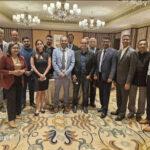We live in a world where literacy is on the rise. More people than ever before can read and write. However, is being literate the same as being educated? Sadly, the answer is no. There is a big difference between being able to read and write and being able to think critically, solve problems, and make informed decisions. This is why we live in the uneducated world of literates.
Examples and cases
Here are some examples and cases of the uneducated world of literates:
- Rape: Rape is a heinous crime often committed by literate people. In many cases, the perpetrators of rape are educated individuals. For example, a recent study in India found that 40% of rape convicts have a college degree or higher.
- Data war: The world is currently engaged in a data war. Countries and companies are racing to collect and analyze as much data as possible. This data is then used to influence people and manipulate behavior. In this data war, it is more important than ever to be able to think critically and evaluate information.
- Increase in corruption: Corruption is a major problem in many countries around the world. Even in developed countries, corruption is a growing problem. This suggests that many people cannot develop the moral compass and ethical values they need to resist corruption.
- While driving wrong lane, overtaking, or traffic signal jumping: These are common examples of traffic violations that are committed by literate people. These violations often lead to accidents and injuries. They suggest that many people are not able to develop the discipline and self-control they need to be responsible drivers.
Are we just clearing the exams but not educating ourselves?
In many cases, yes. We are just clearing the exams but not educating ourselves. Our education system is often focused on rote memorization and passing exams. This does not prepare us for the challenges of the real world.
In order to be truly educated, we need to develop the skills and knowledge we need to think critically, solve problems, and make informed decisions. We also need to develop the moral compass and ethical values we need to live good and meaningful lives.
What can we do?
There are a number of things we can do to address the problem of the uneducated world of literates:
- We need to reform our education system to focus on developing critical thinking skills and problem-solving skills.
- We need to promote lifelong learning and encourage people to continue learning even after they leave school.
- We need to create a culture that values education and knowledge.
- We need to teach our children the importance of ethics and moral values.
It is important to remember that literacy is just the first step. In order to be truly educated, we need to develop the skills and knowledge we need to live good and meaningful lives.
Conclusion
Literacy is essential for personal growth and development, and we need to re-evaluate how we educate ourselves and others. We must cultivate critical thinking skills, problem-solving, and a deeper understanding of ourselves and the world around us. It is essential to educate ourselves throughout our lifetime, and we must strive to be lifelong learners.
On the one hand, we are becoming more aware of the importance of education. We are also developing new tools and technologies to help us learn and grow. For example, online learning platforms are making it easier for people to access quality education, regardless of location or income level.
Overall, we are moving towards a more educated world, but there is still a long way to go. We must focus on developing critical thinking skills, understanding complex issues, and making informed decisions. We also need to create a society where everyone has access to quality education and understands the importance of Common Sense, Love, and care for others.
Selfishness is one more reason for the uneducated world of literates. People today are more self-centered and less interested in learning and growing as individuals. they are not interested in using their literacy to make the world a better place.
Society can play a role in bridging the gap between literacy and education by promoting values such as empathy, compassion, and civic responsibility.

